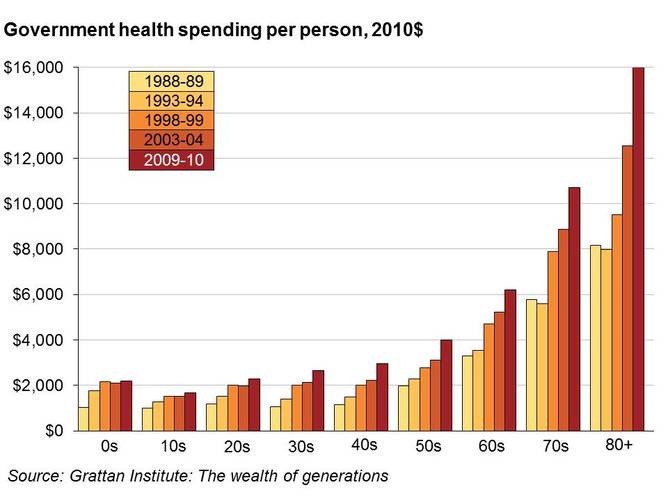Published at The Conversation, Wednesday 10 December
Having enjoyed continuously increasing prosperity since the Second World War, Australians have come to expect that each generation will live a better life than the last. But this steady progress may be at risk. As shown in Grattan Institute’s latest report The wealth of generations, today’s young Australians may end up with lower living standards than their parents at the same age.
Young Australians will bear the costs of fiscal decisions made by past and present governments. The cost of rising government spending on older households and repaying government debt will fall most heavily on today’s young.
Younger Australians have always been net contributors to the budget. Under the generational bargain, people of working age pay more in taxes than they receive in government benefits and services. They then become net takers from the budget in retirement. Strong income growth allowed each generation to take out more from the budget that they put in. But the generational bargain is now at risk.
Many expect incomes will rise more slowly in coming decades, making transfers to older households less affordable. Affordability concerns are compounded by the growing size of net benefits received by older Australians. In 2010, governments spent A$9400 more per household headed by someone above 65 than they did in 2004.
This increase in net benefits for older households was a result of increased spending on health, higher Age Pension payments and lower income taxes.
Spending on pensions increased most with the Howard government’s changes to the pension asset test and the Rudd government’s 10% increase in the base pension rate. On the tax side, concessional superannuation tax arrangements now allow individuals above 60 to materially reduce their income tax liability, by up to $5000 a year. The seniors and pensioners tax offset can also reduce tax payable by up to $1600.
Spending on health has risen particularly fast. Health spending per person has increased for all age groups but it increased most in dollar terms for those above 60. Increased use of services, rather than population ageing has been the main driver. For example, technological improvements allow more medical procedures to be performed safely and successfully on those who are older.
Population ageing will magnify the cost of growing transfers to older households. As the baby boomer generation reaches the “draw down” phase of the generational bargain, Age Pension and government health spending will substantially increase. For example, the Productivity Commission estimates that state and Commonwealth government health spending will increase from 6.5% of GDP in 2011-12 to almost 11% in 2059-60.
Over the last six years, the increased spending on older households was funded through deficits. The cost of the increase in payments to households above 65 was about $22 billion a year. This was a substantial contribution to Commonwealth budget deficits which have exceeded $40 billion per year for four of the last five years.
The cost of these deficits will be worn by younger generations. To repay the accumulated debt, they will pay higher taxes or receive fewer government services. An annual deficit of $40 billion a year implies an additional future tax burden of around $10,000 for each younger household.
Prevention is better than cure
Government policy choices have contributed to the size of the future burden on young Australians. Other policy choices would reduce the risk of the next generation being worse off.
Targeting the Age Pension, reducing superannuation tax concessions and increasing asset taxes (such as taxes on land) could reduce the transfers between today’s younger taxpayers and older retirees. These reforms would fall most on those who have benefited from government largesse and paying lower taxes while deficits accumulated.
These reforms would also significantly contribute to solving government budget problems. Even if all the Commonwealth government’s stalled budget reforms were passed, they will be nothing like enough to bridge the budget gap. Larger scale tax and spending reforms are needed.
If government expenditures on health, pensions and superannuation concessions are cut because budgets cannot sustain them, this will also disadvantage younger Australians. Younger generations, on the wrong side of the drawbridge after the policies change, will have paid for benefits they will never get to enjoy. This strengthens the case for reforming these policies sooner rather than later, and limiting the scope of “grandfathering” provisions.
The generational bargain has served Australia well. Yet it will be undermined if some generations are asked to do more than their fair share. Reforms to pensions, superannuation tax concessions and asset taxation are needed to ensure the sustainability and fairness of the tax and transfer system. Without them, there is a real risk that our children and grandchildren will not enjoy the fruits of Australia’s prosperity as much as their parents.
![]()

